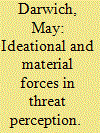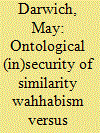| Srl | Item |
| 1 |
ID:
145531


|
|
|
|
|
| Summary/Abstract |
How do states perceive threats? Why are material forces sometimes more prominent in shaping threat perceptions, whereas ideational forces are the motivator in other instances? This article aims to move beyond the task of determining whether material or ideational factors matter to offer an integrated framework based on analytical eclecticism that specifies the conditions under which one of these two factors becomes salient in regimes’ threat perceptions. When regime identity is fixed and the material structure provides multiple strategic options to ensure a state’s physical security, leaders perceive challenges to their identity as more salient. When a state's identity is fluid, providing multiple narratives, and the distribution of military capabilities constrains strategic options for physical security, leaders perceive threats to their physical security as more prominent. As a result, the regime’s identity narrative is reframed to adapt to the constraints of the material structure. To examine the validity of this argument, I analyze the divergent Syrian and Saudi threat perceptions during the Iran–Iraq War (1980–1988).
|
|
|
|
|
|
|
|
|
|
|
|
|
|
|
|
| 2 |
ID:
146349


|
|
|
|
|
| Summary/Abstract |
It has long been argued that identity matters in international relations. Yet how identity impacts enmity and conflict among states remains the subject of debate. The existing literature asserts that differences in identity can be a source of conflict, whereas convergence and similarity lead to cooperation. Nevertheless, empirical evidence from the Middle East has long defied this hypothesis. The Kingdom of Saudi Arabia, which prides itself on being an Islamic model and claims Islamic leadership, has opposed the rise to power of Islamist movements in the Middle East. To address this paradox, this article builds on the growing literature on ontological security to propose a theoretical framework explaining how similarity can generate anxiety and identity risks. This framework, I argue, moves beyond traditional regime security approaches to reveal that security is not only physical but also ontological. I then illustrate the argument through a comparison of Saudi identity risks in the wake of the Iranian revolution (1979) and the ascendance of the Muslim Brotherhood to power in Egypt (2012). Ultimately, these cases provide intriguing insights into foreign policy behavior during critical situations.
|
|
|
|
|
|
|
|
|
|
|
|
|
|
|
|